The chef announced he was going to serve us five fish and seafood dishes and he wasn’t going to tell us what any were until after we’d tried them all.
The response was nervous laughter around a table of seasoned travellers from various countries.
As the five dishes arrived one by one there were debates over what each might be, plates of green balls in batter were prodded as though sticking a fork in one might magically reveal what it was. Some people got stuck in, but quite a few others avoided the mystery dishes as though a bite would result in them falling to the ground clutching at their throats.
We had been presented with a feast of fish and seafood, and much of it was left untouched for one reason. It had been mentioned eel would feature in one of the dishes and a few people were in no rush to try what was basically the fish version of a snake.
A dislike of fish and seafood seems to be something which is not uncommon amongst some nationalities. The Brits and North Americans can be biggest culprits for turning up their noses when faced with a whole fish, octopus tentacles or tiny pyramids of fish roe.
There are a number of reasons people give for not liking fish and seafood, but most don’t hold up very well under close scrutiny.
Excuses why people don’t like fish and seafood
I don’t like the smell
Fish past its best is rank. But fresh fish doesn’t have a strong aroma, it should smell more of the sea than anything else. Walking past the harbour where we live is enough to drive me insane with hunger thanks to the aroma of frying fish which bombards my nostrils. To me it’s one of the best cooking smells going. If the smell of fried fish repelled people, why is fish and chips so popular in Britain? I’ll get back to that later.
I don’t like bones
On the face of it, a fair enough reason. Nobody enjoys having to pick the bones out of every bite they take. But there are two reasons why the bones excuse might be a bit of a… err… red herring. Knowing how to eat different fish means enjoying meals which are bone free. Some fish you peel the flesh off the skeleton from the spine, others from the middle; there’s often a technique. Knowing which to apply takes a lot of experience of eating fish. What’s far easier is to opt for the big fish which are meatier and more likely to be bone free – tuna, cod, grouper etc.
Seafood is rubbery
The rubbery excuse is one I’ve heard applied a lot and sometimes fairly. I’ve eaten jellied cockles in Cornwall whose only merit was they gave my jaw muscles a decent workout. But the likes of squid and octopus should be quite tender when prepared and cooked properly. I’ve eaten pulpo a la gallega in Los Llanos de Aridane on La Palma which was cooked in such a way I could cut it with a fork. Good seafood isn’t rubbery.
I don’t like the texture
It’s an excuse which would only be valid if all fish and seafood had the same texture. A prawn doesn’t have the same texture as cuttlefish and neither does salmon have the same texture as swordfish; the list goes on. Using this as an excuse is a deflection.
I don’t like the taste of fish and seafood
See above. It’s simply not a valid reason. It would only be valid if all fish and seafood had similar flavours. They don’t. As someone who has worked their way through a decent list of what swims and scurries in sea, rivers and lakes I can state quite categorically there is a marine world of different flavours.
I don’t like things with heads and tails
Some people who happily eat filleted fish squirm at the idea of being faced with a fish that still has its tail and head still attached. Similarly squid rings might be okay, they look like onion rings after all, but throw in some squiggly tentacles and you’ll get a different reaction from some people. Not liking the idea of eating a whole fish on a plate, or prawns in their shells piled high in a bowl is probably the most illuminating reason given for having a dislike of fish and seafood.
Fish and chips being one of Britain’s most popular dishes might suggest we’re a nation of fish and seafood fans; over a fifth of the population visit a fish and chips takeaway at least once a week. Yet in his recipe book Taste of the Sea, chef Rick Stein talks about how he tried to push moules et frites in his restaurant in Cornwall for years, without success.
This apparent contradiction is partly because in Britain fish and seafood consumption is mainly limited to cod, salmon, tuna, haddock and prawns. These five account for up to 75% of all fish and seafood eaten. Basically we’re only comfortable eating certain types of fish and seafood.
What makes the crispy golden fish served in the 10,500 chippies around Britain different from fish served with head and tail still attached is it doesn’t look like something which was recently a living creature.
This would suggest it’s nothing to do with taste, texture or smell. It’s all about what the thing we’re putting in our mouth looks like.
If diners had a mini roasted pig, cow or lamb lifelessly staring back at them from their plates, you can bet there would be a lot more people trundling out excuses about why they didn’t like meat that were similar to the ones used by people who say they don’t like fish and seafood.
If someone has an open mind and tries individual foods before they decide they don’t like them, then I respect that. I just don’t buy it when people dismiss a whole food group as tasting the same, especially when I know it to be untrue.
I wonder how they’d react if someone were to say to them, ‘I don’t like meat. It all tastes the same – like a cowpat filled field.’

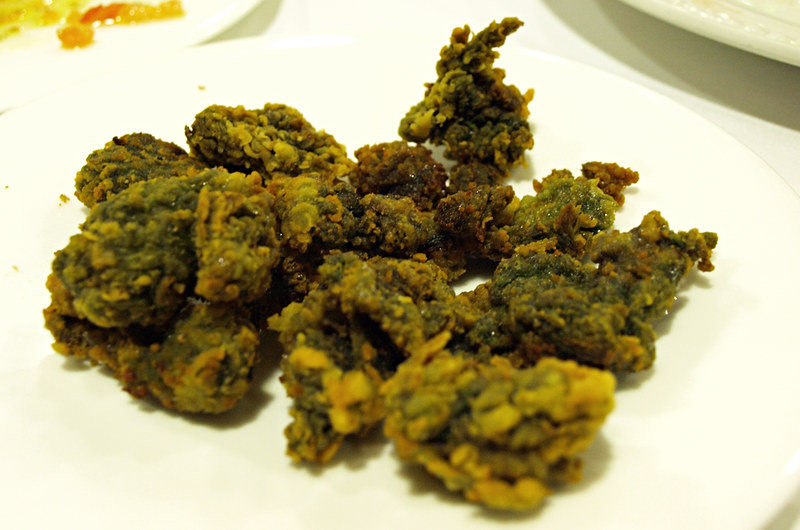
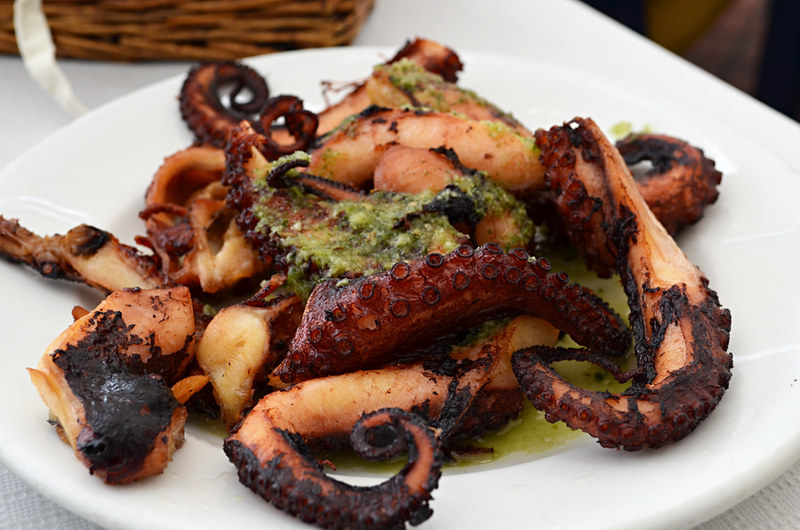
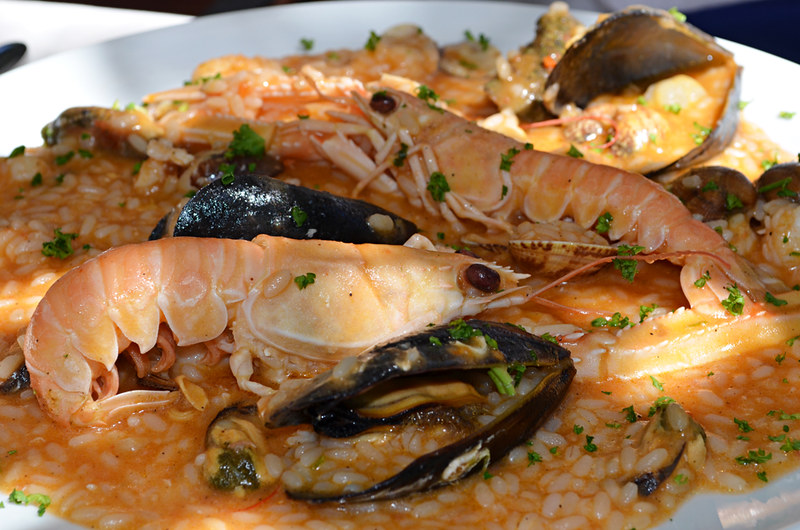
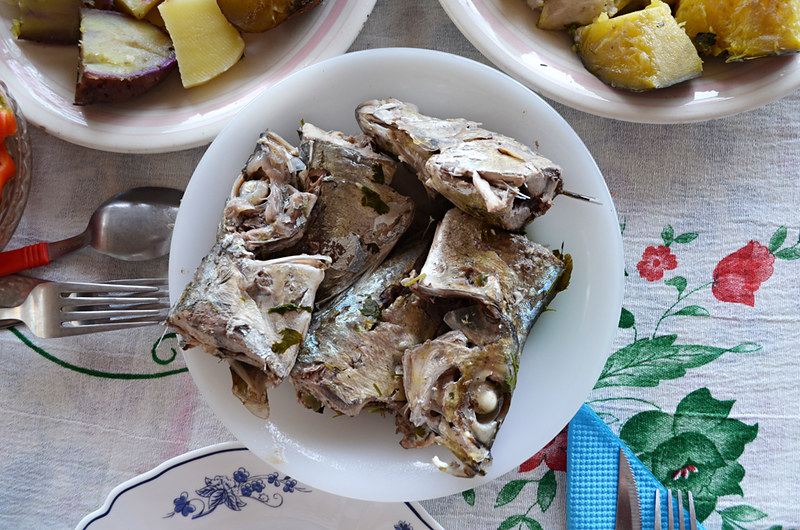
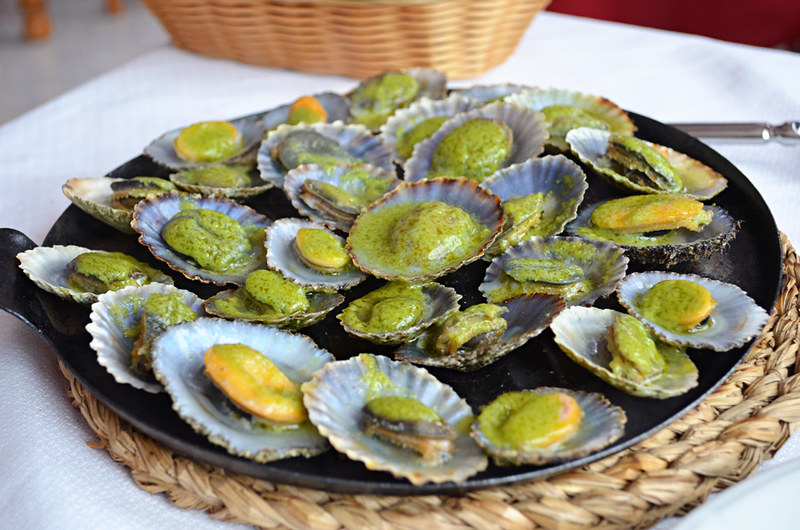
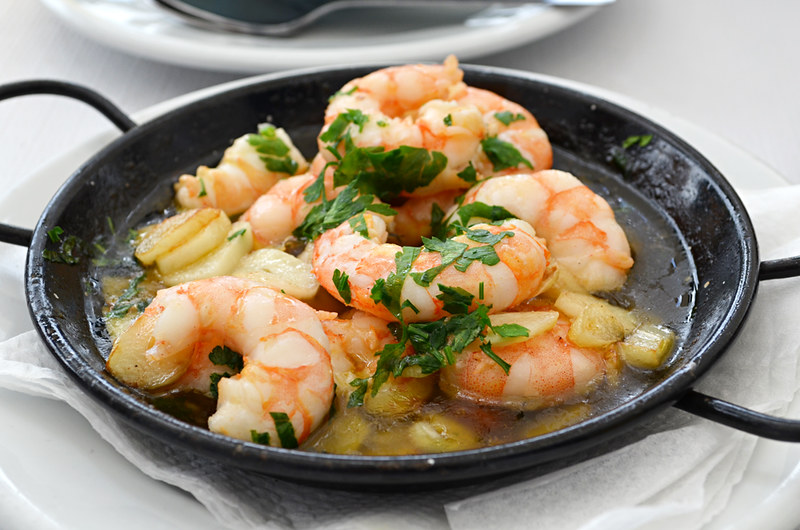
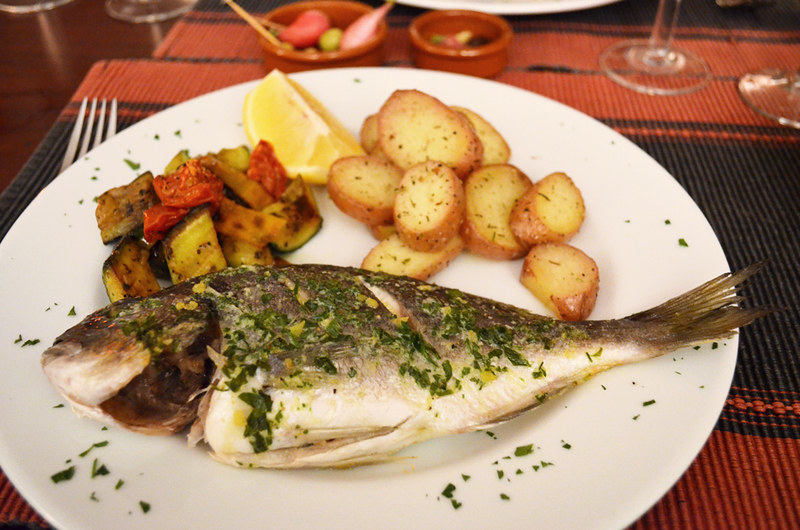

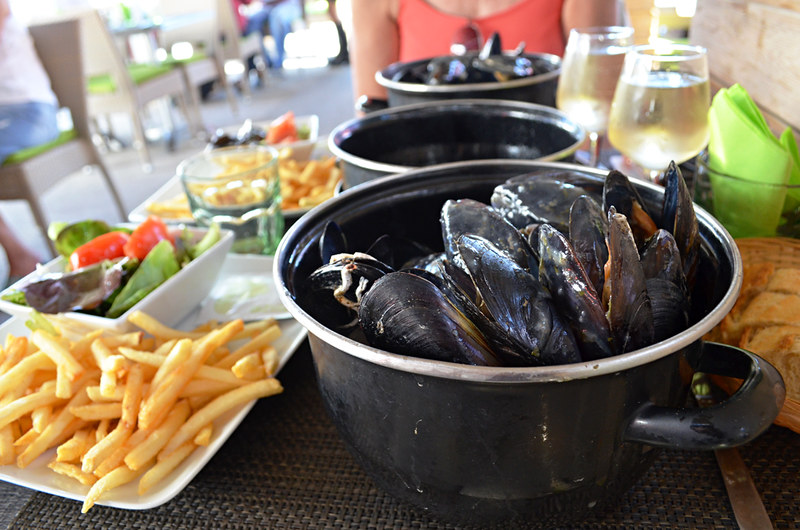



LOL. Funny how peoples’ perspectives can be so different. BTW, as someone who cannot stomach the taste of fish or seafood… they all taste very similar to me. Maybe THAT is the problem. We’re tasting different things, dude. There is at least an underlying similarity between them all that I abhor.
p.s. I love cilantro.
I can stomach most white fish with enough lemon or sauce, but shrimp, oysters, and lobster will not go down no matter how hard I try.
No…all fish or seafood has very distinctive textures like layers or chewiness. It also taste fishy fresh or not with the exception of more popular fried and buttee drenched fish like tuna, redfish, rainbow fish, mahi-mahi etc. They all have somewhat of a musty taste to them and just the smell is overwhelming.
I’m a fan of gastronomic diversity which is why I’m also a fan of fish and seafood, so can’t agree whenever anyone lumps it all together. But here’s food for thought for anyone who insists it all tastes the same. Go to any Michelin star restaurant, or restaurant which specialises in creative cuisine, and order the taster menu. Most dishes on it will involve fish or seafood, with meat usually being reduced to a walk-on role. There’s simply more diversity and therefore more scope for the best chefs to innovate.
I have tried every single type of sea food that has ever passed my face in hopes that I will like it, but to me it tastes like vomit on fire and even if it was to save my life, i wouldn’t be able to swallow a bite. I love fishing I love cleaning fish and cooking fish for my wife or friends but Id rather have a glass rod jammed in my nostrils and broken off then try to eat a meal of seafood. I have tried all shell fish, all fish both cooked and uncooked, I have tried ocean fish, fresh water fish, crabs, shrimp, lobster, crawfish, oyster, clams, muscles etc etc. Some people just don’t like it.
There is no way that you have tried “all” fish. Just saying. No matter how many you list, i bet you have not tried every single one!
Its simply impossible.
Sorry but you are still closed minded.
You don’t really have to try every kind of fish to know that it all tastes like fish. It’s not closed-minded to assume so. Especially when your fish-loving friends tell you “this isn’t fishy” and then you try it and it is. We’re just speaking different languages when we say it tastes like fish and you reply that it’s not fishy. There’s some baseline “this is fish” taste that those of us who react badly to it call “fishy.” There’s another flavor of not-so-fresh fish that the rest of you call “fishy.”
(Also, I believe the previous commenter was using a bit of hyperbole. He listed a laundry list of the kinds of fish he’s tried, because the most common objection to “I don’t like fish” is “well, you haven’t tried X.” We usually have. And it tastes like fish. Which is yucky.)
I like most fish, mainly the meatier ones or sushi, which don’t involve any bones or faces. But with the exception of shrimp, I strongly dislike the flavor of shellfish, including lobster and crab meat. I do enjoy good clam chowder, but that’s because I can’t actually taste the clams in it.
P.S. Odd to see so many recent comments to an article posted two years ago. Someone must have … fished it up.
LOL. I know a lot of people who generally like the taste of fish but don’t like dealing with bones or eating anything with a face. I was exactly the same with bones until a waiter in a restaurant showed me how to eat a particular fish so bones weren’t an issue. After that I realised there was a key to eating different fish which reduced chances of bone-chewing. As for the face, same with meat. I’ve lost count of the number of friends who screw up their faces and make “eeuuw” noises when they see a whole skinned rabbit/piglet in a Spanish supermarket. Folk don’t like to be reminded they’re eating something which was once alive.
“It would only be valid if all fish and seafood had similar flavours. They don’t.”
Well, to me they have a very characteristic taste and smell that I can distinguish a mile away. Some types of fish are lighter on it, like salmon for instance. It goes almost unoticed if served with strong sauce, like caper. But my experience with seafood is that it is unmremarkable at best and repulsive at worst.
“But my experience with seafood is that it is unmremarkable at best and repulsive at worst.” I guess that’s why fish and seafood always dominate every Michelin star chef’s taster menus 🙂
Sorry Jack, but you’re WRONG, WRONG, WRONG!!!
“I don’t like the smell”
I can’t stand the smell of seafood. Be it catch of the day or catch of yesterday. It STINKS, STINKS, STINKS. Also if I smell seafood cooking I feel like I’m going to vomit. I’ve walked out of restaurants because the strong smell of cooking/cooked seafood as soon as I walked in. I also hold my breath as I walk past the seafood counter at the supermarket. I put the smell of seafood in the same repulsive category as feces and rotting garbage.
“I don’t like bones”
Well I can’t relate to this because I hate fish and seafood so much that I’ve never had to deal with bones since I won’t eat it.
“Seafood is rubbery” and “I don’t like the texture”
Again I cannot relate to this either because “Read the Above Comment”.
Also the texture of foods is not a problem for me.
I do know some texture babies out there though.
“I don’t like the taste of fish and seafood”
This is where you piss me off in your article. Because I know for a fact that all fish and seafood have this one predominating flavor that I find repulsive. And that flavor is “THE SEA”. Sure cod might taste different from lobster but “THE SEA” flavor and smell is in ALL fish and seafood. Even fresh water fish has this smell.
“I don’t like things with heads and tails”
Well who would like that?
I don’t want an animals skin, eyeballs and asshole on my plate.
I also don’t like to eat anything that looks like bugs.
And shrimp, lobster and crabs are just giant gross insects from the sea.
Thank you! So aside from not liking it, I’ve tried everything from whale to shrimp, I recently figured out I have an allergy to it. I get sick from eating it so I couldn’t if I did like it. I will literally throw up if the smell alone in to pungent.
Total agreement here. All fish and seafood has a particular taste in the background that I think those who like fish don’t even taste. For me the flavor is so similar to the smell of rotten meat that it triggers my “that’s not food! abort!” reflex.
Even the freshest seafood (I grew up in Alaska, so it’s not like I haven’t been exposed to it) smells fishy. That baseline level of fishy is what turns my stomach. I’ve tried and tried, had samples of the best seafood my friends and family rave over. It all tastes like Not Food. I don’t like mushrooms, but they taste like food. I can eat them without gagging. Not so with seafood.
And I’m not even picky. I like basically everything in the produce aisle (except cilantro) and the meat counter. I’ll eat organ meats and game without hesitation. But the entire category of fish and seafood is a no-go for me. (Even seaweed has that certain special flavor that triggers gagging from me.)
I get not posting offensive or aggressive comments. It’s just that it’s pretty condescending to assume it’s not about the smell or flavor when it is totally about the smell and flavor.
AMEN, Thank You!
I’m more than happy to allow comments from people who disagree, especially when they involve sensible, reasoned arguments. It’s an opinionated piece, I expect people to have strong and conflicting opinions. But I ain’t going to approve abusive posts so anyone planning on penning one of those can jog on.
People don’t like certain foods, that’s a thing and I think you’re being unreasonable if you refuse to accept that. I hate seafood, will not eat it, don’t want to try it, and I cannot stand the smell. This article is not going to convince me to try it no matter how much passion for seafood was poured into this while writing. When I talk to people who do like seafood I always get the “oh well you probably never had it prepared really fresh or cooked really well” excuse, this may surprise them but I don’t care either way. I don’t like it and I won’t try it. I’m a very picky eater and I don’t even eat meat for the same reason, I hate the smell, texture, color, and taste. Some people though don’t want to accept that someone does not like certain foods -they won’t accept that for an answer or cannot fathom that some of us are picky eaters. I believe that’s what I find so frustrating about all of this.
I think your comment is refreshingly honest Amanda, and it actually illustrates what the overall point is. Sometimes it is simply that people are picky eaters, that’s all, but try to mask this with a raft of excuses which simply don’t hold up to objective and rational scrutiny. Thanks for this.
Sorry, Jack but I think you really missed the mark with this one.
I cannot stand seafood in any form. My strong aversion to seafood isn’t some psychosomatic response, I WANT to like seafood. I’ve seen plenty of seafood dishes that look appetizing and were crafted by skilled chefs. I’ve tried lobster, crab, shrimp, salmon, tuna, mahi-mahi, swordfish, cod, anchovies, trout, etc. Though they are of course different in flavor and texture, there are enough similarities to classify them together. It is that baseline that the seafood-averse like myself cannot get past. And no, I don’t care for the smell of fish, even in its freshest form.
The same arguments you presented could be used against those who don’t like blue cheese (which I love). Oh, well there are actually many different types of blue cheese with so many different flavors and textures! There’s gorgonzola, roquefort, stilton, point reyes, cabrales, cambozola, and so on! And yet, they’re all still classified under the umbrella of “blue cheese” – which many people cannot stand. Though there is plenty of variation, they are all underpinned by being blue cheese.
Despite not liking seafood, I nevertheless have a very diverse palate. I enjoy most everything else, and despite what your writing suggests, I haven’t been put off by a pig’s face staring back at me as I carve delicious cuts from it’s cooked carcass.
The bottom line is that there ARE a raft full of reasons (what you referred to as “excuses” in your commentary) why people like or dislike things ranging from genetic to environmental. Nature and nurture.
While you celebrate gastronomic diversity, you don’t appear to accept the diversity of the human palate. Just as there are a variety of flavors, and nuance to those flavors, the same is true of an individual’s palate – there is variation to how one *perceives* those flavors and textures. Since we cannot swap out tastebuds to perceive food the way that others do, what we’re left with is something entirely subjective – something that cannot be quantified objectively.
Imagine the arrogance of telling someone that their own perceptions (which is the thing that really matters) are invalid. Indeed, something does smell fishy here.
What an ignorant article. Firstly, everyones taste is different, secondly there is a common taste that all seafoods share, it’s the fact that it comes out of the sea and smells and tastes of the sea water (As you mentioned above). And no, having grown up by the sea, I have never enjoyed the smell while walking along the Harbour smelling the sea.
Some people also try to convince me that adding tons of lemon will make it better. Why do I have to add it to make it taste in the first place?
As nobody has anything new to add to this, and some folk are unable to conduct themselves in a civilised fashion online, I’m closing the comments section. I eat fish and seafood a lot purely because, to me, there is such a wide variety of tastes. Some others who don’t like it believe it all tastes the same – a few commenting it all tastes of the sea (interestingly even when it comes from freshwater sources). We’re never going to see eye to eye on that, so we’ll just have to agree to differ. Thanks to all those who left sensible comments on both sides of the debate.